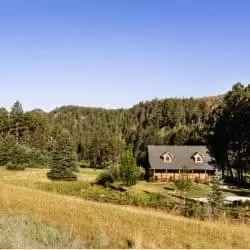Many people are faced with the decision of whether to live in the city or the countryside. However, not many truly understand what each lifestyle entails. If you find yourself unsure about which option is best for you, don't worry. I've experienced both city living and country living, and I'm here to share my insights with you.
What is Country Living?
When we talk about country life, we refer to living outside of a major city. Country living can take on two different forms: rural settings or areas with sparsely spaced houses. In this article, we'll focus more on living in more populated rural areas rather than secluded ones.
Advantages of Living in the Country
 {:style="margin:auto;display:block;width:50%"} Picture: A charming country house nestled in nature.
{:style="margin:auto;display:block;width:50%"} Picture: A charming country house nestled in nature.
Sense of Community
One of the biggest advantages of country life is the sense of community. Living in a close-knit rural area allows you to know your neighbors by name and build strong connections with them. Community events and outings are common, bringing like-minded people together.
In my experience, when building our dream home in the country, we quickly got to know everyone on our road. The shared choice of country life created a strong bond among neighbors, leading to fun nights, new friendships, and a greater appreciation for outdoor spaces. This sense of community is something we rarely experienced in the big city, where people tend to keep to themselves.
Beautiful Scenery
Rural living offers breathtaking scenery and a closer connection to nature. The natural beauty of the countryside provides endless opportunities for outdoor exploration and picturesque landscapes. The absence of city pollution enhances the air quality, allowing you to breathe in the fresh, clean air.
 {:style="margin:auto;display:block;width:50%"} Picture: Rolling hills in the countryside.
{:style="margin:auto;display:block;width:50%"} Picture: Rolling hills in the countryside.
More Privacy
In the country, privacy is more attainable. With fewer people around, you can find tranquil and secluded spots. Your closest neighbor is usually at a comfortable distance, giving you the space you need.
Affordable Homes
Country homes are often more affordable, offering a chance to live comfortably within a smaller space. The cost of living in rural areas is generally lower than in the city. Additionally, when building in the country, you often get a larger lot and more house for your money.
Community-minded People
Country living fosters a strong sense of community. People in rural areas tend to be more community-oriented and spend time together outside of work or school. The camaraderie and openness among neighbors are refreshing and can lead to lasting connections.
Less Pollution
Living in the country means less exposure to pollution. The air quality is generally better, allowing you to savor the purity of the countryside. This cleaner environment can have a positive impact on your health and well-being.
Quiet and Less Traffic
One of the noticeable differences between country and city life is the tranquility and lack of traffic in rural areas. The slower pace of life and the absence of constant hustle and bustle provide a peaceful atmosphere. The shorter commute times also contribute to a less stressful lifestyle.
Health Benefits
Contrary to popular belief, country living can be healthier than city life. While cities offer a variety of food options, rural areas provide the opportunity to grow your own food. Having a garden can lower food costs and provide access to fresh, homegrown produce. Additionally, the abundance of outdoor space in the country encourages an active, nature-centric lifestyle.
Rich Culture and Traditions
Rural areas often retain traditional and cultural practices. Church gatherings, farmers' markets, and family-owned businesses are more prevalent in small towns. This preservation of culture and heritage adds depth and charm to country living.
Lower Crime Rate
Compared to cities, rural areas generally have lower crime rates. The lower population density makes it less prone to criminal activities, providing a safer environment for residents.
Hiking Trails and Forests
Living in the country grants you easier access to hiking trails and forests. If you enjoy exploring the great outdoors, the countryside offers an abundance of natural beauty and picturesque landscapes. City living, on the other hand, may limit access to such natural wonders.
Drawbacks of Country Life
While country living may sound idyllic, there are also some drawbacks to consider.
Lack of Employment Opportunities
Living in the countryside may limit your career options due to the scarcity of job opportunities. Finding suitable employment can be challenging, and commuting to urban areas for work may become necessary. Additionally, limited day camps and child care facilities can pose a challenge for families.
Limited Stores and Shopping Options
One disadvantage of living in the country is the limited availability of shopping options. Finding a wide variety of products, especially specialty items, may be more difficult. However, with the rise of online shopping, access to goods is improving even in rural areas.
Lengthier Repair Times
In rural areas, repairs can take longer to complete. Finding reliable mechanics or repair services may be challenging due to the limited options. Waiting for parts or scheduling repairs can be more time-consuming than in urban areas.
Housing Choices
While rural housing prices are generally lower, the limited inventory can be a drawback. It may take time to find a house that suits your preferences and needs. Building a home in the country can also come with longer timelines and potential challenges with wells and septic tank systems.
Lack of Public Transportation
Living in the country necessitates owning a car as public transportation options are limited. Commuting and running errands often require personal vehicles, resulting in increased wear and tear and higher transportation costs.
Limited Amenities and Services
Access to amenities such as specialized stores, entertainment venues, and services may be more restricted in rural areas. Additionally, the convenience of options like Amazon Prime's two-day shipping may not be as readily available.
Limited Online Access
Internet access in rural areas can be less reliable and slower compared to urban areas. Remote work and access to online resources may be challenging, although technological advancements are improving connectivity in rural regions.
Difficulty Finding Like-Minded Individuals
Finding people with similar interests or hobbies can be more challenging in the countryside due to the smaller population. If you value being surrounded by a community of like-minded individuals, living in a rural area may limit your options.
Advantages of City Living
Living in the city comes with its own set of advantages that may appeal to certain individuals.
Career Opportunities
Cities offer a wider range of job opportunities due to the multitude of businesses and industries present. The proximity of workplaces to residential areas reduces commuting time and allows for greater career growth.
Transportation Options
 {:style="margin:auto;display:block;width:50%"} Picture: Transportation options in the city.
{:style="margin:auto;display:block;width:50%"} Picture: Transportation options in the city.
Living in the city provides access to various transportation options such as public transit, biking lanes, and walkable neighborhoods. Commuting and getting around becomes more convenient, reducing the need for personal vehicles.
Abundance of Amenities
Cities offer a plethora of amenities such as restaurants, shops, entertainment venues, and specialty stores. The convenience of having everything within reach makes urban living appealing to those who enjoy a vibrant and diverse lifestyle. Services like food delivery and ride-sharing further enhance the convenience of city living.
Proximity to Everything
Living in the city means being close to everything. Whether it's restaurants, shops, entertainment options, or educational institutions, urban areas offer easy access to a wide range of amenities. The convenience of having everything nearby is a significant advantage for city dwellers.
Disadvantages of Urban Life
While city living offers many advantages, there are also some drawbacks to consider.
Higher Housing Prices
Housing costs in urban areas tend to be higher due to increased demand. Limited space and high population density drive up prices, making it more challenging to find affordable housing.
Lack of Privacy
 {:style="margin:auto;display:block;width:50%"} Picture: Lack of privacy in city living.
{:style="margin:auto;display:block;width:50%"} Picture: Lack of privacy in city living.
Living in the city often means sacrificing some privacy. With neighbors in close proximity and a bustling urban environment, finding quiet and secluded spaces can be a challenge. If privacy is important to you, city living may not be the ideal choice.
Limited Space
Urban living typically involves limited living space. Compact apartments or high housing costs may lead to living in close quarters with neighbors. However, the convenience and accessibility of city living often offset these space limitations.
Lack of Nature
Cities lack the abundant natural spaces found in the countryside. Parks and green areas may be limited, with more land being dedicated to residential or commercial buildings. If being close to nature is important to you, city living may not provide the same opportunities for outdoor exploration.
Limited Parks
Access to parks and recreational areas may be more limited in urban settings due to higher population density and scheduled events. While many cities have designated green spaces, the availability and size of these parks may not match what is available in rural areas.
Traffic and Inconvenient Driving
City dwellers often face heavy traffic and congestion, especially during rush hours. Commuting can be time-consuming, leading to increased stress levels. Additionally, finding parking can be a major challenge in urban areas.
Pollution
 {:style="margin:auto;display:block;width:50%"} Picture: Pollution in the city.
{:style="margin:auto;display:block;width:50%"} Picture: Pollution in the city.
Cities are more prone to pollution, including air pollution from factories and higher levels of traffic. Exposure to pollutants can have negative effects on health, such as increased respiratory problems. It's important to consider the potential health impacts of urban living.
Higher Crime Rate
Cities generally have higher crime rates than rural areas due to higher population density. Property crimes and thefts are more prevalent in urban areas, although crime levels can vary by neighborhood.
Higher Cost of Living
In general, city life comes with a higher cost of living. Housing prices, food expenses, and transportation costs are often more expensive in urban areas. The abundance of options and entertainment can also lead to increased spending.
Finding the Right Balance
Deciding between city life and country life is a personal choice that requires careful consideration. If you prefer more space but still want a reasonable commute, exploring options just outside the city limits can offer a compromise. These bedroom communities provide a hybrid living situation that combines the best of both worlds.
Ultimately, the benefits and drawbacks of city and country living depend on your personal preferences and priorities. Consider what is most important to you, weigh the pros and cons, and make a decision that aligns with your lifestyle and values. Remember, both city life and country life can bring happiness and fulfillment.
You + Sharing This = Us as Best Friends


















